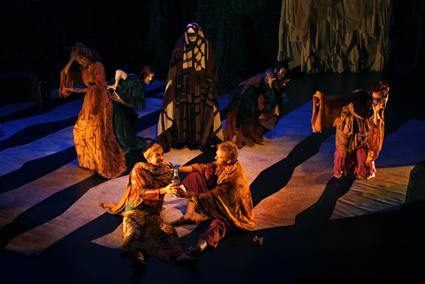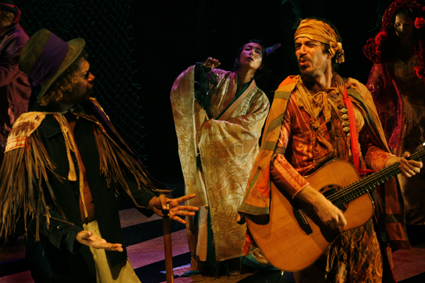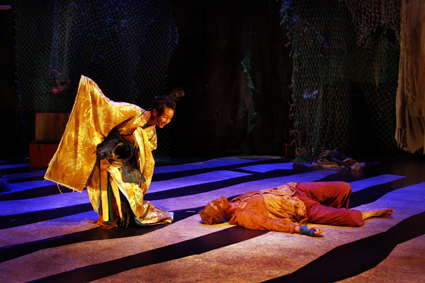our small eternities
victoria carless: centre for australasian theatre, the colony

The Colony, Centre for Australasian Theatre
photo © CfAT/Savannah Productions
The Colony, Centre for Australasian Theatre
BIG SPECTACLES CALL FOR BIG DREAMS, AND OFTEN THEY DEMAND BIG RISKS TOO; THIS AS ARTISTS WE INSTINCTIVELY KNOW. IT’S CLEAR THAT BIG DREAMS WERE AT THE HEART OF THE COLONY, THE FIRST WORK FROM FAR NORTH QUEENSLAND’S NEWLY ESTABLISHED CENTRE FOR AUSTRALASIAN THEATRE.
An ambitious concoction of dance, live sound, film and spoken word, The Colony presents the last days of a group of lepers shipped to a nameless tropical island on the periphery of mainstream society. The text, by Sydney-based writer Graham Henderson, explores humanity’s big-ticket items—love, death and the influence on our lives of the natural world.
In the beginning things look promising. Patterns radiating on the slick wet stage suggest the comforting constancy of the tide. In the lighting design is all the sultriness of the tropics, shot through with overripe yellows and reds. A cast of gloriously dishevelled figures melt through their final days, led shambolically by a man called Hamlet, a chronic journal writer. He is cared for by the other inhabitants, including a minstrel, a ghost and a woman named Christmas, until the day he finds himself “in that baroque room at the end of time.”

The Colony, Centre for Australasian Theatre
photo © CfAT/Savannah Productions
The Colony, Centre for Australasian Theatre
The performers are clad in exquisite rags created by Australian fashion legend Linda Jackson. The costumes seem to have been made by the earth and the sea, and something more intangible, placing us in a sort of anytime. The colonised folk shelter together in a structure of ghost net and marine debris (by Aurukun artists Mavis Ngallametta and Craig Koomeeta, with Guy and Gina Allain), evoking the impermanence of the inhabitants’ make-do world; their disturbing temporality.
Visually it is all quite stunning, yet when the performers speak and the action unfolds there is a disconnect between characters and dialogue and each other. No one seems to quite know what to do with themselves, or where they are going. There is a fair amount of moping and flinging about of bandages and from time to time someone dies. The character of Irina, a ghost, appears at times to be haunting a different show. More Elvira than White Lady, she delivers soundscape pitch perfect to the north, featuring both curlew cries and gecko chitchat, but it remains unclear what she means to Hamlet.
In a random dance segue (by choreographer Catherine Hassall), a kind of spaced-out, hippy groove sesh, everyone ends up on the floor. Even the ghost gets down with it, and it is a relief to learn that the characters have a sense of humour. Finally, albeit briefly, the audience has been let into the work. This is a show laden with meaningfullness; it’s just difficult to figure out which particular meaning to latch onto. The many ideas swim, wave and drown, each of them unresolved.

The Colony, Centre for Australasian Theatre
photo © CfAT/Savannah Productions
The Colony, Centre for Australasian Theatre
It is the character of Christmas who perhaps gives us the best entry point, referring to individual existence as “our small eternity.” Here we are reminded of the contradictory elements that make up our existence—things like beauty, grief and wonder, and how our slow crawl towards the inevitable may be perceived as simply the colouring-in of time.
The signs were all pointing to something big, something breathtaking even, but somehow the parts didn’t add up to the whole. Yet I hope the makers of The Colony continue on their journey; big dreams are wonderful things and only by testing them out in reality may we truly see what is possible.
Centre for Australasian Theatre, The Colony, writer Graham Henderson, director Guillame ‘Willem’ Brugman, ART Ensemble: Warren Clements, Piers Freeman, Srianjali Gunasena, Catherine Hassall, Sue Hayes, Jeremiah Johnson, Miyako Masaki, Kara Ross, costumes Linda Jackson, sound Jeremiah Johnson, Nigel Pegrum, scenography Guy & Gina Allain with Mavis Ngallametta and Craig Koomeeta, film Savannah Productions; JUTE Theatre, Centre of Contemporary Arts, Cairns, Nov 16-23
This article originally appeared as part of RealTime’s online e-dition Jan 30, 2013
RealTime issue #113 Feb-March 2013 pg. 31






